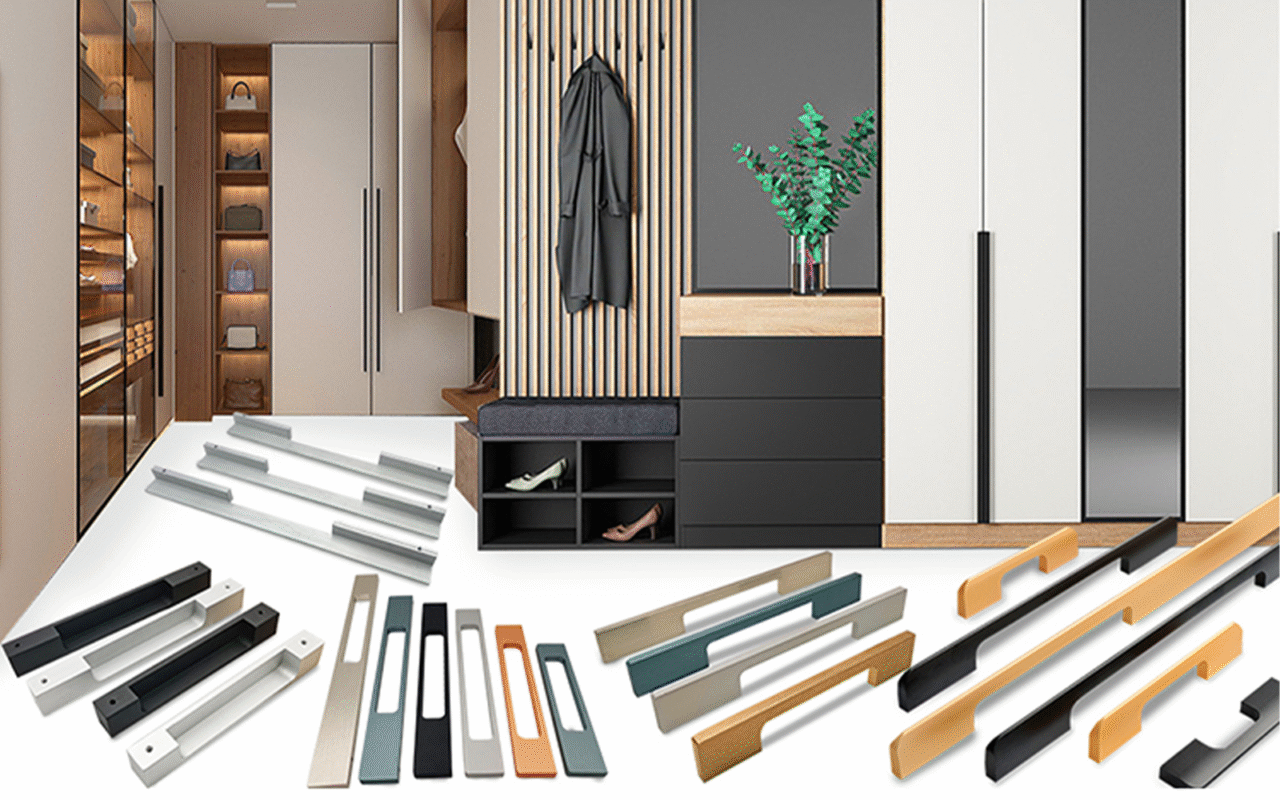In modern homes, aluminum household hardware has become a go-to choice for cabinet handles, door frames, furniture trim, and decorative fittings. But many homeowners still ask: “Will aluminum rust like iron or steel?” The short answer is no — aluminum does not rust in the same way as ferrous metals. Instead, it develops a unique protective layer that makes it both durable and corrosion-resistant.
This article explores the science of aluminum’s oxidation, how to enhance its performance through modern surface treatments, and what you need to know when choosing and caring for aluminum household hardware.
Aluminum’s “Self-Protection” — The Natural Oxide Film
Unlike steel, which is prone to red-brown rust, aluminum forms a thin, transparent oxide film on its surface the moment it is exposed to air. This process occurs naturally and almost instantly.
-
What is the oxide film?
It is a microscopic layer of aluminum oxide (Al₂O₃) that bonds tightly to the surface, sealing off the underlying metal from further exposure to oxygen and moisture. -
Why is this important?
This natural film acts like a shield, preventing the type of progressive corrosion seen in iron. Instead of spreading and weakening the material, the oxide film stabilizes the surface. -
Real-world proof:
High-quality aluminum household hardware can pass a 72-hour salt spray test without fading, deforming, or corroding. This makes it particularly suitable for kitchens, bathrooms, and other moisture-prone environments.
In short, aluminum is inherently resistant to corrosion thanks to this self-protecting natural barrier.
Why Aluminum Doesn’t Rust Like Steel
When we talk about “rust,” we usually mean the flaking, powdery oxidation of iron and its alloys. Aluminum, however, doesn’t contain iron, so it doesn’t form rust. Instead, it undergoes controlled oxidation:
-
Rust vs. Oxidation:
-
Rust weakens steel by expanding and cracking surfaces.
-
Aluminum’s oxidation is stable and protective, actually strengthening its resistance.
-
-
Practical Benefits for Hardware:
-
Durability: Aluminum hardware remains structurally sound even in high-humidity or coastal environments.
-
Lightweight Strength: Despite being lighter than steel, aluminum offers excellent support for household fittings.
-
Longevity: Properly finished aluminum frames and handles can last for decades with minimal maintenance.
-
This makes aluminum household hardware a safe investment for homeowners who value both aesthetics and reliability.
How to Enhance the Corrosion Resistance of Aluminum Household Hardware? — Surface Treatment Processes
Although aluminum’s natural oxide film is protective, manufacturers often use surface treatments to improve aesthetics and durability. These treatments make aluminum hardware more resistant to scratches, wear, and color fading.
1. Anodizing
-
What it is: An electrochemical process that thickens the natural oxide film.
-
Advantages:
-
Creates a harder, more durable surface.
-
Can be dyed in various colors — black, champagne, bronze, gold, or custom shades.
-
Improves resistance to fingerprints, stains, and UV fading.
-
👉 That’s why алюминиевые ручки often come in multiple finishes, offering more variety than traditional wooden or steel handles.
2. Powder Coating
-
What it is: Spraying dry powder paint and baking it onto the aluminum surface.
-
Advantages:
-
Offers smooth, uniform finishes in matte, glossy, or textured effects.
-
Excellent for modern kitchens and wardrobes needing a sleek look.
-
3. Electroplating or Painting
-
Less common than anodizing and powder coating but still used in certain decorative hardware.
-
Adds shine and visual depth, often used for luxury furniture accents.
4. Mechanical Polishing or Brushing
-
Gives the surface a mirror-like or satin finish.
-
Often combined with anodizing to balance beauty and protection.
With these treatments, aluminum household hardware becomes not only functional but also a design highlight that complements interiors.
A Guide to Choosing and Caring for Aluminum Household Hardware
When shopping for or maintaining aluminum household hardware, keep these professional tips in mind:
🔎 How to Choose the Right Hardware
-
Check the Finish
-
Choose anodized or powder-coated surfaces for better durability and color retention.
-
Confirm whether the hardware has passed durability standards such as the 72-hour salt spray test.
-
-
Prioritize Customization Options
-
Aluminum is easy to process into various shapes, so look for manufacturers offering custom sizes and finishes.
-
Handles, trims, and frames can be tailored to match kitchen cabinets, wardrobes, or furniture.
-
-
Match Colors with Interior Design
-
Aluminum hardware offers a wider range of colors than stainless steel or wood alternatives.
-
Neutral tones like silver, black, and white are versatile, while champagne or gold finishes add luxury.
-
-
Evaluate the Manufacturer’s Expertise
-
A professional supplier ensures precise extrusion, stable finishes, and reliable accessories.
-
Quality manufacturing minimizes defects such as uneven surfaces or color fading.
-
🛠️ How to Care for Aluminum Hardware
-
Routine Cleaning: Use mild soap and water; avoid abrasive cleaners that can scratch finishes.
-
Avoid Strong Chemicals: Keep away from strong acids or alkalis that can damage anodized or coated surfaces.
-
Polish if Needed: For brushed or polished aluminum, use a soft cloth to restore shine.
-
Inspect Joints and Screws: Ensure frames, handles, and fittings remain tight and aligned.
With minimal care, aluminum household hardware will retain its functionality and beauty for years.
The Truth About Aluminum Hardware and Rust
So, will aluminum household hardware rust? No. Unlike steel, aluminum does not form rust. Instead, it develops a natural oxide film that protects against corrosion. With modern anodizing, powder coating, and surface treatments, aluminum becomes even more durable, customizable, and stylish.
For homeowners and designers, this means that aluminum handles, frames, and trims are not only practical but also aesthetic investments that stand the test of time. From kitchens to wardrobes, bathrooms to living rooms, aluminum household hardware combines durability, versatility, and design freedom — making it a smart choice for the modern home.

